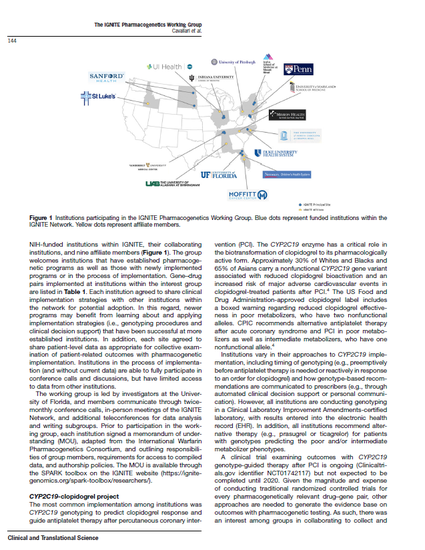
Article
The IGNITE Pharmacogenetics Working Group: An Opportunity for Building Evidence with Pharmacogenetic Implementation in a Real-World Setting
CTS: Clinical and Translational Science
(2017)
Abstract
Genotype is increasingly recognized as an important factor influencing the likelihood for drug effectiveness or risk for adverse events. Genetic information is now included in US Food and Drug Administration-approved labeling for over 130 drugs, and in some cases, the information is in the form of a boxed warning given the potentially serious implications of genotype on drug response. Based on the growing body of evidence supporting genetic contributions to drug response, the Clinical Pharmacogenetics Implementation Consortium (CPIC) was formed to provide consensus guidelines on interpretation and translation of genotype results into actionable prescribing decisions.[1] Guidelines have been published for 18 drugs or drug classes as of late 2016. The Precision Medicine Initiative is expected to further drive discoveries in genomic medicine and their translation to patient care.[2] In 2013, the National Institutes of Health (NIH)-funded Implementing GeNomics In praTticE (IGNITE) network was established to support the development and investigation of genomic medicine practice models to enhance its implementation into routine clinical practice.[3]
Publication Date
May, 2017
DOI
10.1111/cts.12456
Publisher Statement
For a complete list of authors, please see article.
Citation Information
Jennifer N. Eichmeyer. "The IGNITE Pharmacogenetics Working Group: An Opportunity for Building Evidence with Pharmacogenetic Implementation in a Real-World Setting" CTS: Clinical and Translational Science Vol. 10 Iss. 3 (2017) p. 143 - 146 Available at: http://works.bepress.com/jennifer-eichmeyer/4/
Creative Commons license

This work is licensed under a Creative Commons CC_BY-NC-ND International License.
